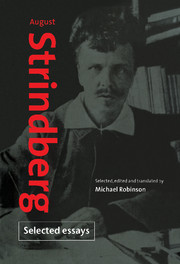Book contents
- Frontmatter
- Contents
- Notes on the text
- Introduction
- from Vivisections (1887)
- ‘On Modern Drama and Modern Theatre’ (1889)
- from Vivisections II (1894)
- ‘I’
- ‘The Making of an Aspasia’
- ‘Nemesis Divina (Cont.)’
- ‘The New Arts! or The Role of Chance in Artistic Creation’
- ‘Whence We Have Come’
- ‘Character a Role?’
- ‘Césarine’ (1894)
- ‘Deranged Sensations’ (1894)
- ‘In the Cemetery’ (1896)
- from Jardin des Plantes (1896)
- ‘On the Action of Light in Photography’ (1896)
- ‘A Glance into Space’ (1896)
- ‘Edvard Munch's Exhibition’ (1896)
- ‘The Synthesis of Gold’ (1896)
- ‘Contemporary Gold-Making’ (1896)
- ‘The Sunflower’ (1896)
- ‘The Mysticism of World History’ (1903)
- ‘August Strindberg on Himself’ (1909)
- Notes and commentary
- Index
‘Whence We Have Come’
Published online by Cambridge University Press: 18 December 2009
- Frontmatter
- Contents
- Notes on the text
- Introduction
- from Vivisections (1887)
- ‘On Modern Drama and Modern Theatre’ (1889)
- from Vivisections II (1894)
- ‘I’
- ‘The Making of an Aspasia’
- ‘Nemesis Divina (Cont.)’
- ‘The New Arts! or The Role of Chance in Artistic Creation’
- ‘Whence We Have Come’
- ‘Character a Role?’
- ‘Césarine’ (1894)
- ‘Deranged Sensations’ (1894)
- ‘In the Cemetery’ (1896)
- from Jardin des Plantes (1896)
- ‘On the Action of Light in Photography’ (1896)
- ‘A Glance into Space’ (1896)
- ‘Edvard Munch's Exhibition’ (1896)
- ‘The Synthesis of Gold’ (1896)
- ‘Contemporary Gold-Making’ (1896)
- ‘The Sunflower’ (1896)
- ‘The Mysticism of World History’ (1903)
- ‘August Strindberg on Himself’ (1909)
- Notes and commentary
- Index
Summary
A little girl is brought into the world by an overclass mother, an acknowledged beauty. The girl looks like an old man in miniature.
Bald on the crown of the head, a little shock of hair on the temples, but with her sleek hair trimmed short like a dignified old man; domed and lined brow like a philosopher's; she puts her finger to her brow or nose with a gesture full of profundity; her mouth toothless and sunken as in decrepit old age.
The young woman evidently starts off from where the old man ends.
But she also enters life as a meat-eater. Her sustenance is exclusively animal, and vegetable foods act as poison.
Just like us, says the partridge, where only the young eat nothing but worms while the elderly birds are vegetarians.
Between the ages of about 3 to 4 my little girl is an angel, the ideal human being, unconscious, with the teeth of a sheep, the canines appearing last. How erratic this evolution is, and what do all these sudden shifts mean?
No trace of an ape!
On Christmas Eve another Darwinist and I met an extremely welldressed 6-year-old boy on a Berlin pavement; he was standing in front of a shop-window, gazing at the miraculous toys. We both stopped short at this delightful sight. A countenance at once open and firm, an angelic expression in his big, clear, innocent eyes, beneath honey-blond locks.
- Type
- Chapter
- Information
- August Strindberg: Selected Essays , pp. 108 - 110Publisher: Cambridge University PressPrint publication year: 1996



